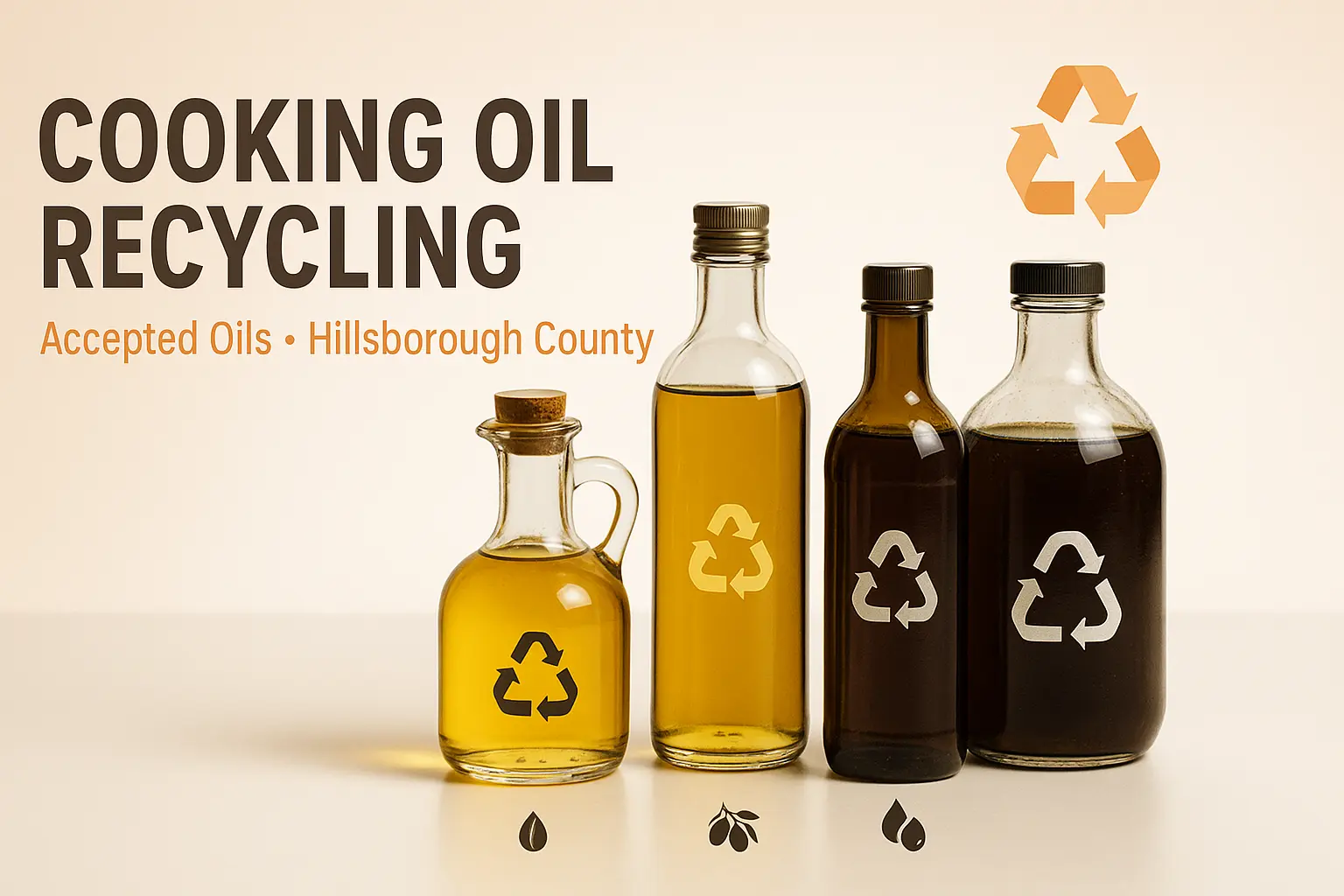Table of Contents
The Tampa Fryer Story: Why Knowing Your Oil Matters
Every day in Tampa kitchens, hot oil leaves the fryer carrying the flavors of grouper sandwiches, Cuban bread, and plantain chips. When that oil cools it turns from culinary hero to potential plumbing villain. Pouring it down the drain hardens it inside sewer lines, leading to backups that shut kitchens and attract hefty municipal fines. Hillsborough County solved this headache with the Cooking Oil Recycling Effort, known locally as CORE, which turns yesterday’s frying medium into tomorrow’s renewable diesel.
Understanding exactly which oils the program accepts is the first step to keeping drains clear and cash flowing back into your business. This guide walks you through the county’s rules, the science behind acceptable oils, and the logistics that make recycling effortless whether you run a seventeen-seat bistro in Ybor City or manage concessions at Raymond James Stadium. hcfl.gov
How Hillsborough County Handles Grease, From Library Jugs to Licensed Haulers
Hillsborough’s Public Utilities Department maintains more than two dozen bright green CORE cabinets at libraries, parks, and pump stations. Residents fill sturdy jugs at home, cap them, and slide them into the cabinet slots any time of day. The county then partners with registered grease haulers who empty those cabinets, filter the oil, and ship it to biodiesel plants.
Commercial kitchens follow a parallel path: state law requires businesses to use a licensed hauler, and Grease Connections fulfills that mandate across the county with sealed containers, scheduled pickups at off-peak hours, and digital volume tracking. CORE stations stay limited to household quantities, while restaurants can recycle hundreds of gallons monthly and earn direct rebates that offset frying costs.
Accepted Oils: A Practical Field Guide
County inspectors classify oils by their ability to be filtered, dewatered, and converted into ASTM grade biodiesel. The table below lists every product the CORE program and licensed haulers accept, along with kitchen examples to help your staff sort waste correctly.
| Oil or Fat | Typical Kitchen Use |
|---|---|
| Canola | Neutral-flavor frying for seafood baskets and sweet plantains |
| Corn | Tortilla chip fryers in Mexican and Tex-Mex kitchens |
| Vegetable blends | General-purpose fry stations in fast casual chains |
| Sunflower or Sesame | High-heat wok cooking and salad dressings |
| Olive (light or pomace) | Sauté pans and Mediterranean appetizers |
| Peanut | Traditional turkey fries and high-smoke-point batches |
| Soybean | Bulk frying in cafeterias and stadium concessions |
| Lard or Bacon Grease | Flavor base for Southern biscuits and collards |
| Rendered Animal Fats | Burger griddle runoff and rotisserie drip trays |
CORE rejects motor oil, shortening still in the bucket, and any oil diluted with dishwater or cleaning chemicals. Keeping these contaminants out preserves rebate values and ensures every gallon turns into low carbon fuel instead of landfill waste.
From Skillet to Storage: Meeting the County’s Quality Standard
The path from fryer to jug starts the moment cooks shut down the line. Let the oil cool to a safe handling temperature, then strain it through a fine mesh to catch breading crumbs that accelerate rancidity. Next, transfer the oil into a rigid container with a screw-top lid; old fryer oil boxes with plastic liners split too easily during transport. Never mix animal fat with soapy rinse water or bleach; these liquids create emulsions that clog CORE filtration screens and void commercial rebates. Label the container with the date and the primary oil type so haulers can batch-grade loads quickly.
Businesses that produce more than fifty gallons a week qualify for on site tanks from Grease Connections, which include antifatigue mats around the fill port and spill proof locking lids that satisfy county inspectors. When volumes spike during the Gasparilla festival or football season, a quick text adds extra pickups within forty eight hours, maintaining food safety and avoiding overflow.
Dollars, Diesel, and a Cleaner Hillsborough Tomorrow
Recycled fryer oil travels west on Interstate Four to blending facilities that refine it into renewable diesel, a drop in fuel powering municipal trucks and local school buses. Each gallon diverted from the drain prevents about sixteen pounds of carbon emissions while saving Hillsborough’s wastewater utility thousands of dollars in clog repairs.
Restaurants share in that value: current market rates pay ten to fifty cents per gallon, with Tampa’s independent eateries averaging sixty to one hundred twenty dollars back each month. The process is paperwork light; Grease Connections logs weights automatically, emails EPA compliant manifests, and deposits payments directly into your account. Beyond cash, a visible recycling program comforts eco-conscious diners and satisfies Florida Department of Health grease management rules during inspections.
The next step is as simple as counting your fryers: text HILLS to (888) 996-9064 Grease Connections, receive your container, and join the countywide circle that turns last night’s oil into tomorrow’s clean commute.









